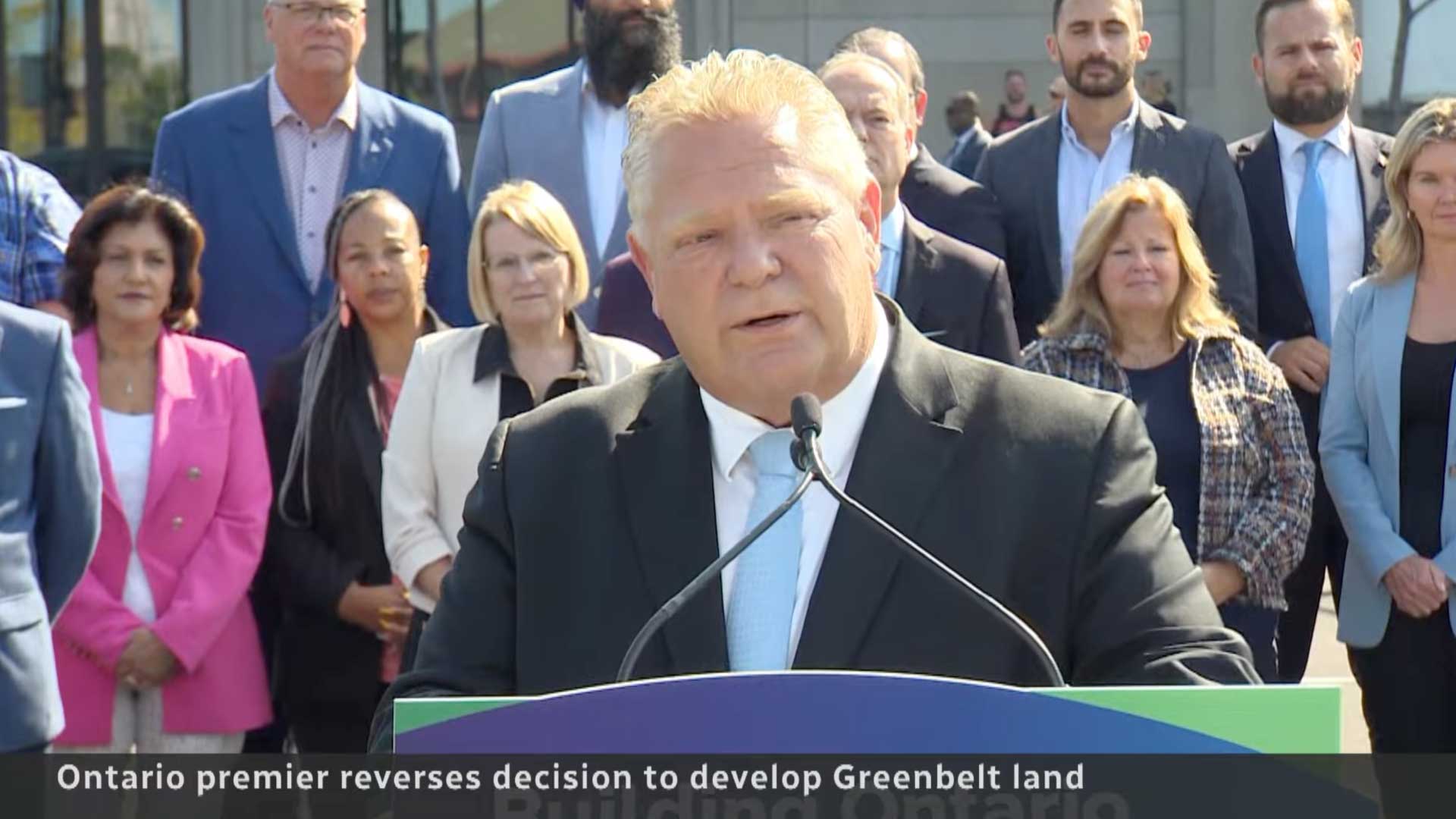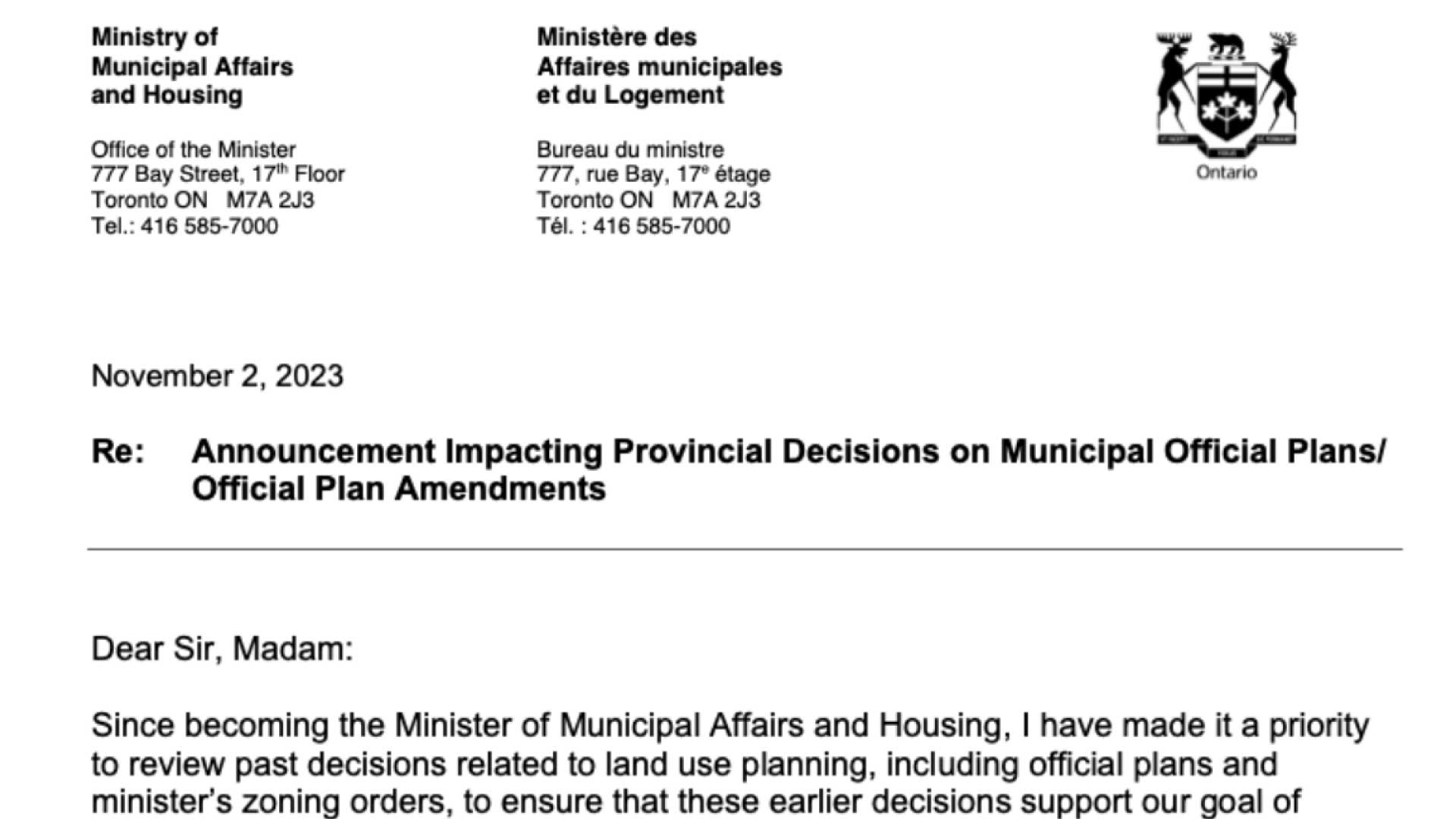The Ford government has made a mess of planning. Now, municipal governments have a chance to correct some of that.
Our open letter on the reversal announced by this government to changes made to municipal official plans, outlining our concerns with a lack of accountability and transparency in how the Minister is proceeding.
The Greenbelt scandal is a symptom of a larger problem, of a trend towards a lack of accountability in democratic decision making.
Anyone who follows the news in Ontario will know that this government has been forced into a humiliating retreat in its attempt to give land from the Greenbelt to a select group of well-connected developers.

This screenshot is from CBC’s coverage of Premier Ford’s announcement of the reversal of the Greenbelt land take-outs.
As you read through the rest of this piece, consider the theatre of this image, with the many MPPs arrayed behind the Premier, and the difference between that nod to collective accountability and the private message from the new Minister to mayors.
See more of CBC’s coverage here.
What is less well known is that another major policy reversal, with many parallels to the Greenbelt scandal, is currently underway, too. For many, this second reversal may be even more impactful than that which deals with the Greenbelt.
At around the same time that Greenbelt lands were being carved up, municipalities across Ontario were sending their Official Plan to the Ministry of Municipal Affairs and Housing for approval.
Official Plans are the result of years of hard work. Town halls were held and public engagement portals established so that residents could be involved in the process, providing input into how their communities would be shaped over the coming years. Municipal staff, mayors, and councillors worked to incorporate this feedback, representing a dialogue between local government and citizens, into the plans, such that they reflected the priorities of communities they represent. And, finally, these plans were debated and passed by municipal councils, elected by and accountable to their constituents.
The process in Ontario is for these plans, passed by municipalities, to then be sent on to the Ministry for approval. This is in large part due to the role that the provincial government is meant to play in overseeing and coordinating regional planning. So, accordingly, plans were sent to the Ministry. Within short order, however, many of these plans were returned with lines crossed out, words replaced, and whole paragraphs added.
Official Plans Changed Unilaterally
In Hamilton, the Official Plan was changed so that thousands of hectares of farmland meant to remain off limits to development was, instead, opened up for development. (Ryan Amato, Chief of Staff to Minister Clarke and who was central to the Greenbelt scandal, was also involved with this decision.)
Closer to home, Barrie’s Official Plan was edited to water down requirements for affordable housing and increased density, among many other changes that developers wanted but hadn’t been included.
Often the changes made by the Ministry closely follow language used in requests for changes to the plan that were made by third parties, namely developers or their representatives.
Again, well connected developers had what seemed like a preferential connection to the Minister’s office that, in effect, placed their interests above that of the public. The result was the overriding of the processes of public engagement that helped to shape the Official Plans passed by municipalities. Voices of community members, as a consequence, were ignored and shut out.
This is a view of community ownership that sees it as belonging to developers, rather than those who live and work there.
Retreat, or Attempt to Do An End-Run
The retreat from these changes are likely an attempt to stem the deluge of negative responses to the government’s misleading of the public, to their preferential treatment of some of the province’s wealthiest individuals, and to their disregard for due processes and democratic accountability.
On the Ministry’s website, the announcement of the reversal states that they would “wind back provincial changes to official plans and official plan amendments”. In the statement there are two specific exceptions, namely, “in circumstances where construction has begun” or “where doing so would contravene existing provincial legislation and regulation”.
That’s what the Minister is telling the public.
What he’s telling mayors, privately, is very different.
The End-Run
In an email to mayors, recently leaked to Environment Defence, the Minister makes assurances that the province will accept, “changes that the municipality would like to see made to the official plan, based on the modifications that the province had previously made, and which you [the Mayor] support.” (Emphasis added.)

A clipping of the letter, which was leaked to Environmental Defence, that Minister Calandra sent privately to mayors, in which he indicates they may make unilateral changes to Official Plans.
Find the whole letter on Environmental Defence’s website, here.
As with the Greenbelt scandal, decision making authority is being removed from the processes previously established.
Public input and engagement is left out, due and deliberate process is left out, incorporating the expertise of staff is left out. Those with access to mayors, whether inside or outside of established channels, have the advantage.
The informality of this is exactly what characterised the process, or lack thereof, that led to the Greenbelt land take-outs – trips by MPPs and staff together with developers to Las Vegas, invitations to family weddings where manilla envelopes with instructions on which land parcels should be removed from the Greenbelt were passed between developers and members of the government, government members using personal phones and email for correspondence, which makes it difficult for records of communications to be obtained.
Why Due Process is Important, and Conclusion
It seems strange to have to say this, but necessary given the repeated actions of this government – due processes exist for a reason, which is that they are transparent, accountable, and as such provide outcomes that benefit all of society, not just a select few.
The Ministry has it right with its public statement – Official Plans should be reinstated as they were passed by municipal councils.
The Minister, however, does not have it right with his private message to mayors. Even with so-called “strong mayor” powers, mayors do not have the mandate to unilaterally change an Official Plan.
To that end, we are heartened that some mayors of affected communities, including Barrie’s, seem to have come out in favour of fully reinstating the Official Plan as it was developed through the established process.
This is important, we believe, to underline democratic principles of due process, including public participation and accountability.
It is also important as it reaffirms the mandate linked to the passage of the Official Plan, which was that of the previous council. Substantial changes to work done by past councils, or any other government for that matter, without using established processes, is an extremely problematic precedent to set.
We recognize that as time passes changes may be necessary, but this must be done using the processes in place. The Official Plan is updated every 5 years, and processes such as secondary plans can address changes outside of that timeframe. These processes include council, public engagement mechanisms, and ensure that any changes made remain accountable to the public.
Official Plans are among the most important components of planning and building our communities, the places where we live, play, and work. They deserve to be given the highest level of consideration, which includes the best possible process of deliberation.
